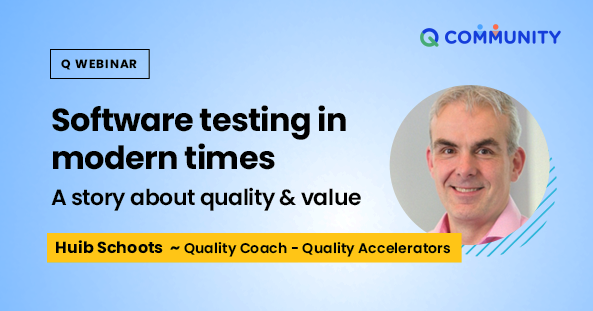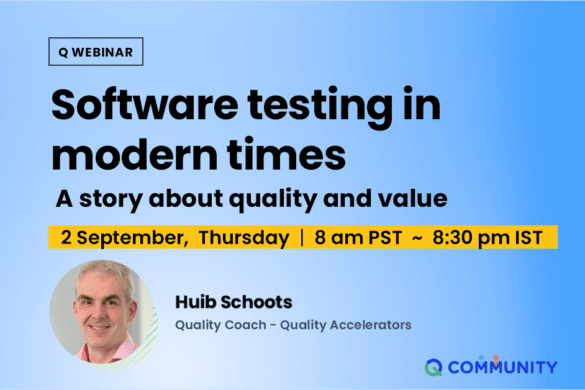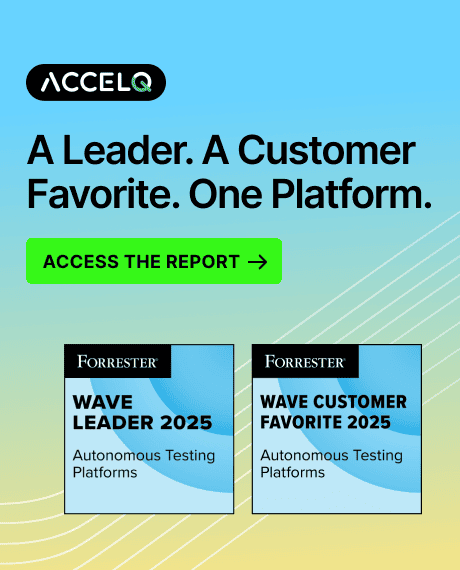
Software Testing in modern times: A story about quality & value
2 September, Thursday | 8 am PST | 8.30 pm IST
Hello Q Community,
Software Development is a complex thing. We are dealing with customers who do not exactly know what they want. We also have to deal with complexity, confusion, changes, new insights, and half-answers. This requires research and experiments to create valuable software. Since my first days in IT, over 20 years ago, I hear discussions about how testing is always a bottleneck! It doesn’t add real value, it’s slow and expensive. Also, there are stories on how test automation can replace expensive testers. To CTO’s it sounds comforting that all these expensive resources can be replaced by automation, doesn’t it?
In agile and especially DevOps approaches the motto is: automated everything! Companies like Facebook claim they do not have testers at all. Microsoft only has SDET (software development engineers in Test), other companies are T-shaping developers to do the testing. The new kid on the block is AI and machine learning, which will definitely replace testing I hear people claim. What is really happening globally? Do we no longer need testers? Can we actually automate everything? How can we make valuable software for our clients?
In this interactive session, we will look at quality mindset, risks, and value. We’ll dive into how to make testing work in modern times. Testing makes developers look good! And developers make testing easier. And that is why developers (read: everybody in IT) should understand what modern testing can look like and how it can be very valuable, fast, and fun. Our clients expect us to speed up and go faster. So how can we fine-tune our work to make this expectation real? How can we deliver quality software fast? As a team we can do this, but only if we collaborate… In this talk, I will share my experience in collaborating with developers as a tester and working with development teams as an agile and quality coach. We’ll explore and discuss the quality mindset. What does it mean? And how can you change it if needed? I will share stories about great and not-so-great collaboration in teams. I will talk about different mindsets and shine a light on topics such as test strategy, collaboration, and testability. Stories that inspired others to up their game and experiment with new ways of working. Working together to create valuable software for our clients!
Key Takeaways
- How can we create quality software fast?
- How can your team manage risks and value?
- Learn about quality mindset and great collaboration in teams, new ways of working to create valuable software for our clients!
About the Speaker – Huib Schoots
Huib Schoots has over 25 years of experience in IT. His personal mission is shaping better people and software quality by connecting, innovating, facilitating, coaching, enabling, and teaching. He is fascinated by mindset, thinking, behavior, and collaboration. He is active in many communities.
He is a humanist, servant leader, open, direct, creative, idea generator, result-driven, humor, problem solver, curious, confronting, critical thinker, passionate and energetic, lifelong learner, entrepreneurial, analytic, and continuous (world) improver. He likes hanging out with friends, playing trombone in a brass band, board & computer games, LEGO, photography, running, beer brewing, magic tricks, traveling, and reading. He works as an Operational Director & Quality Coach @qualityaccelerators, Agile Test Expert @deagiletesters.nl, organizer @frogsconf & ministryoftesting. He is also one of five Rapid Software Testing Instructors @rapid-software-testing.
About 
Q Community aims to build and serve a community of Test Automation enthusiasts with a primary objective to find and nurture ways to transform test automation to be simpler, more reliable, and sustainable for the real world. Our vision is to drive community initiatives to make Automation easily accessible to the project teams and eliminate traditional skill-based silos within organizations. Keeping in line with the latest trends in the technology space, No-Code is explored as one of the primary means to achieve this objective.

































